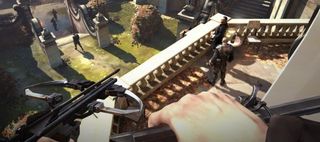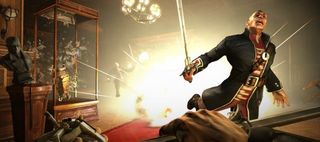Dishonored preview: power, possession and pacifism in a hand-crafted world

The best moments of the stealth playthrough came from this sense that the player should be allowed to solve problems however they see fit, particularly when it comes to combining Corvo's magical powers. Creeping around the outer wall of a parlour where one of the Pendleton brothers was arguing with a prostitute, Colantonio explained the possession ability - which we've previously seen being used to take control of rats and fish - can be upgraded at great cost to allow Corvo to enter into the bodies of humans. So what's to stop the player just possessing his targets and chucking them off something high? Apart from the fact that Corvo would die along with his host, not very much.
We watched Corvo take control of Custis Pendleton and walk him out onto the balcony before closing the door behind him so that his prostitute - who'd noticed the change in his behaviour - couldn't see. Corvo then materialised behind Pendleton, who turned, made a brief exclamation, and was promptly wind-blasted off the balcony to his death. Faking a suicide, magic assassin style.
The game, Colantonio claims, is full of “unplanned features” - techniques that testers have discovered that are too enjoyable to be removed simply for the sake of balance. “We want to make you feel powerful”, Colantonio told me. “The first reflex from a game designer is then to make sure that [the game] prevents you from doing all those cool things, by some sub-rules.” Stealth action games are at their best when the player is capable of bending the rules, however, and it's promising that Arkane are resisting the temptation to place hard limits on the player's creativity. In another example, they showed us how it's possible to possess a target during a fall to make previously lethal drops completely safe. Corvo's time-stop power can be combined with possession to freeze a guard at the moment he fires, take control of him, and then walk him around in front of his own bullet.
A few things stood out about the second playthrough. Dishonored is still a stealth game, even when the player approaches it with a mandate to murder everyone. Its movement features - slides, leaps and ledge grabs - don't quite make it first-person Assassin's Creed, but there's a similar sense of needing to think about positioning before committing to a skirmish. Once a fight begins, Corvo racks up a body count quickly. Colantonio's work on Dark Messiah of Might and Magic shows in the melee combat system's parries, counters, and slow-motion decapitations, and time stop can be used to neutralise a room full of enemies very quickly. In fact, the recent Dishonored trailer , while heavily staged, does a decent job of expressing the pace of combat. Many of the same mechanics - aerial assassinations, peering through keyholes, slaughtering targets mid-sentence - were also apparent in the live demonstration.

It was also during these running battles that a few cracks started to show. Each new set of guards seemed surprised to see the assassin that had just noisily dispatched their comrades in the next room, and the AI - which during the stealth playthrough had responded to Corvo with impressive responsiveness - seemed largely helpless. Dishonored is still in tuning, and for the sake of the demonstration Corvo had been given access to every top-level power - but until we get our hands on it we won't be able to say if these superpowered rampages will be able to sustain our interest over a whole game. The action mode approach was also substantially shorter, and Colantonio observed that a run-and-gun player would be able to finish the campaign twice as fast as someone who takes their time.
There should be a lot of replayability. Corvo's powers are unlocked and upgraded with runes, a finite magical currency found throughout the game. It won't be possible to max out everything, so players will have to decide where to specialise. There are also bone charm collectibles that unlock additional passive bonuses, such as a health boost every time Corvo successfully assassinates someone from above, or an affinity for white rats that allows him to possess them for longer. These bonuses are drawn from a pool of around forty and randomly assigned each time you play. Then there's the city and the narrative itself: Smith explained that the world becomes “a sadder place” in response to a violent Corvo, with more rats and plague victims in the streets. Characters will respond to the way the player accomplishes each mission, and the ending will also be affected - though Colantonio expressed a distaste for “gamifying” morality systems, so don't expect a status bar with “good” at one end and “evil” at the other.
It was an impressive showing for a game with a huge amount of promise. The stealth action genre couldn't be closer to the heart of PC gaming, and if Dishonored really can provide the kind of creative freedom that Human Revolution lacked then it could be one of the biggest games of the year. In any case, it's absolutely one to watch.
The biggest gaming news, reviews and hardware deals
Keep up to date with the most important stories and the best deals, as picked by the PC Gamer team.
Joining in 2011, Chris made his start with PC Gamer turning beautiful trees into magazines, first as a writer and later as deputy editor. Once PCG's reluctant MMO champion , his discovery of Dota 2 in 2012 led him to much darker, stranger places. In 2015, Chris became the editor of PC Gamer Pro, overseeing our online coverage of competitive gaming and esports. He left in 2017, and can be now found making games and recording the Crate & Crowbar podcast.
Most Popular



